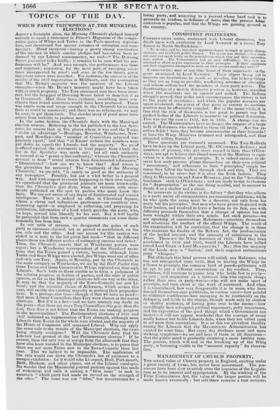CONSISTENT POLITICIANS.
CONSERVATIVE union, contrasted with Liberal dissension, was dwelt upon with exultation by Lord SANDON at a recent Tory dinner in North Staffordshire- " 1.00 wonder, said he, that their opponents began to laugh at public demon- strations, and to ridicule public (linnets. The reason was obvious— How could nut meet nod speak boldly on the principles on whirls they and their sit tiporters were unites Tie Conservatives had no M101 difficulties: thry o ere not ashamed or afraid to give expression to their principles. If their opponents
aud their hopportela attempted to meet, on what ground could they unite ?"
Cnuservatives may at any time boast of their superiorits itn the point mentioned by Lord SA741110N. Their object being not to improve our institutions as much as possible, but to keep things as they are as long as po-sible, cotillicting schemes of alteration and reform seldom lead the members of their party astray. The disadvantage of a merely defensive p ,sitien is, however, manifest when the assailants are in earnest awl united. The Reform struggle proved, that under such circumstances the victory is not to the party of resistance ; and when the popular energies are again awakened, the power of that party to recover its previous position may be effectually crippled. But in the mean while, it is true that the risk of dissension is too great to permit any but packed bodies of the Liberals to assemble for political discussion. This was not the case in 1832, nor in 1835. A change has oc- curred. The Ministerialists have no longer the support of a large body of Reformers who confided in them till lately. Are the se- ceders fickle? have they become unreasonable in their demands? or have the Whig Ministers trimmed and retrograded, and thus alienated willing friends?
These questions are variously answered. The Tory-Radicals have broken up the Liberal party, Mr. O'CONNELL declares ; and numbers of persons, who pay more regard to facts than °VON.. NELL, are apt to believe that abandonment of the Ministry is equi- valent to a dereliction of' principle. It is indeed curious to ob- serve how such persons plume themselves on their own political " consistency," and adherence to their " principles," simply be- cause they follow the leaders through thick and thin. They are consistent, to be sure—but it is after the Irish fashion. They cling to MELBOURNE and JOHN RUSSELL, just as the "hereditary bondsmen " stick to O'CONNELL ; and are ready to-day to clamour for" Appropriation" as the one thing needful, and to-morrow to deride it as a shadow and a cheat.
So inveterate in its victims is the fallacy " that they who adhere to a party under all circumstances are consistent politicians, while he who quits the camp must be a deserter, not only from his party but his principles," that men who have grown disgusted with their leaders, and resolved to leave a faction to its fate, can with difficulty persuade themselves that a change of opinion has not been wrought within their own minds. Let such persons—we are speaking of conscientious Reformers—catechize themselves and scrutinize the conduct of the official Whigs. The result of the examination will be conviction, that the change is in those who maintain the finality of the Reform Act, the predominance of' the landed interest, and the necessity of' submission to the Peers. These are the Whig doctrines of' 1838. Had they been proclaimed in 1832 and 1835, would the Liberals have rallied round Lord GREY or Lord MhLBOURNE ? No; then the majority of the Lords were a " faction," and their angriest reclamations puny " whispers." But although this brief process will satisfy any Reformer, who has not retrograded since 1832, that in leaving the Whigs he adheres to principle, the common herd of pseudo-politicians will be apt to put a different construction on his conduct. They, doubtless, will continue to praise him who holds fast to party— to men ; and stigmatize as a turncoat him who regards things rather than men or party-words—who will not make sport of principle, and turn about at the word of command. And when it is remembeied, how very disagreeable it is to some, who have fancied themselves sage politicians, to confess error—how painful to withdraw coufidence—how annoying to be continually on the defensive, and liable to the charge, though made only by shallow or shabby partisans, of' having gone over to the enemy—how unwillingly men relinquish ironical supremacy, petty importance, and the expectation of the good things which a Government can bestow—it will not appear wonderful that the courage of many really honest but feeble Liberals fails, when they are called upon to act upon their convictions. It is on this too prevalent timidity among the Liberals that the MELBOURNE Administration has existed for some time. But every day discloses more and more striking symptoms—we see and hear of them in all directions— that the public mind is gradually obtaining a more healthy tone. The process, which will end in the breaking up of the Whig party, is becoming visible to the "meanest capacity" for observa- tion.


























 Previous page
Previous page